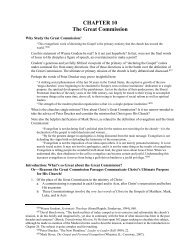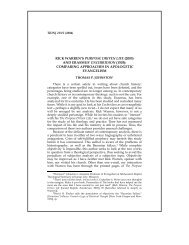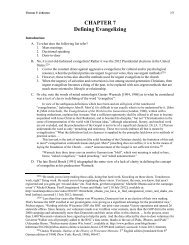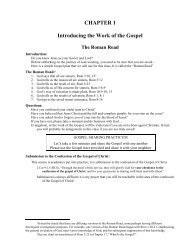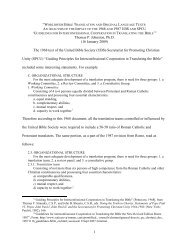Four Categories of Evangelism Programs - Evangelism Unlimited
Four Categories of Evangelism Programs - Evangelism Unlimited
Four Categories of Evangelism Programs - Evangelism Unlimited
You also want an ePaper? Increase the reach of your titles
YUMPU automatically turns print PDFs into web optimized ePapers that Google loves.
Thomas P. Johnston 1015<br />
and when he had called the saints and widows, he presented her alive. 42 And it became known<br />
throughout all Joppa, and many believed on the Lord.”<br />
This same emphasis is also discussed in relation to a widow who is a widow indeed:<br />
1 Tim 5:9-10 (NKJ), “Do not let a widow under sixty years old be taken into the number, and not unless<br />
she has been the wife <strong>of</strong> one man, 10 well reported for good works: if she has brought up children, if<br />
she has lodged strangers, if she has washed the saints' feet, if she has relieved the afflicted, if she has<br />
diligently followed every good work.”<br />
Notice especially the people to whom she ministers, and the order in which they are listed:<br />
Her children<br />
Strangers, a parallel to traveling evangelists (Tit 3:13-14) or angels in disguise (Heb 13:1)?<br />
Saints, clearly <strong>of</strong> those in the household <strong>of</strong> the faith<br />
Afflicted (or oppressed, cf. Heb 10:32-34), as in remembering those in prison (Heb 13:3)<br />
There also seems to be a clear parallel with the ministry <strong>of</strong> the excellent wife in Prov 31:<br />
Prov 31:20 (NKJ), “She extends her hand to the poor, Yes, she reaches out her hands to the needy”<br />
In this light, how are we to understand the words <strong>of</strong> Jesus in Matt 6:1?<br />
Matt 6:1, “Beware <strong>of</strong> practicing your righteousness before men to be noticed by them; otherwise you have<br />
no reward with your Father who is in heaven”<br />
Introduction: Considering the concept <strong>of</strong> service being a Preparatio Evangelica to the Gospel:<br />
<strong>Four</strong> main approaches to “service”:<br />
1. Service allowing proximity to the contact for evangelism<br />
2. Service as a necessary work which must precede the Gospel1182 3. Service as a replacement for communicating the Gospel<br />
4. Service as part <strong>of</strong> “working out” one’s salvation (e.g. in Roman Catholicism)<br />
Notice some contemporary examples:<br />
1. New Jerusalem Bible (Roman Catholic) translation <strong>of</strong> Rom 1:[1] 2, “set apart for the service<br />
<strong>of</strong> the gospel”; the NASB reads for this phrase, “set apart for the gospel <strong>of</strong> God”; the French<br />
1910 Segond adds the word “announce,” reading, “is à part pour annoncer l'Évangile de<br />
Dieu”; the Greek reads, avfwrisme,noj eivj euvagge,lion qeou/. The argument is: what is meant<br />
by “unto the Gospel”?<br />
2. Franklin Graham, “Jesus ministered to the physical needs <strong>of</strong> people before preaching the<br />
Good News to them” (BGEA monthly letter, September 2003, 2):<br />
a. This approach is very common and not-a-most-biblical concept<br />
b. The canonical order <strong>of</strong> verbs is almost always as such: preaching, proclaiming, then<br />
healing (Matt 9:35)<br />
1182 See my Chart 65, “Guide to Evangelical Drift Portrayed in Charts 66-75,” in Charts for a Theology <strong>of</strong><br />
<strong>Evangelism</strong> (Nashville: Broadman, 2007), 104-05. In this chart I have delineated the following 12 approaches to<br />
proclamation and service (please consider the progression):<br />
(1) Service is a supernatural outflow <strong>of</strong> proclamation (the result <strong>of</strong> changed lives)<br />
(2) Service is an opening for proclamation (to evangelize in closed countries)<br />
(3) Service is a bridge to proclamation (allowing proximity for evangelism)<br />
(4) Service is a preparatory grace for proclamation (providing relevance to the Gospel)<br />
(5) Service is a preferred preparatory grace for proclamation (adding credibility to the Gospel)<br />
(6) Service is a necessary preparatory grace for proclamation (adding power to the Gospel)<br />
(7) Service is an equal partner to proclamation (the two mandates, spiritual and social; both are necessary together)<br />
(8) Service is an end in itself, apart from proclamation (need not be to together; both are legitimate ends in<br />
themselves [<strong>of</strong>ten tied somehow to the Great Commission)<br />
(9) Service is primary over proclamation (conversion agenda is secondary to social agenda)<br />
(10) Service is proclamational evangelism (conversion agenda hinders social ends and means; proclamation is<br />
unnecessary [e.g. Francis <strong>of</strong> Assisi, “Preach the Gospel at all times, and if necessary use words”])<br />
(11) Service is proclamational evangelism (proclamational evangelism is actually counterproductive)<br />
(12) Service is proclamational evangelism (conversion agenda hinders church ends; proclamational evangelism is<br />
unbiblical and the method <strong>of</strong> heretics or the unlearned and ignorant).



